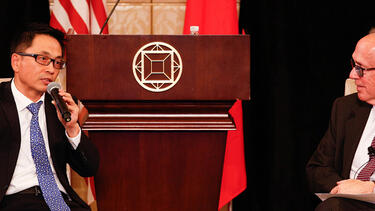All Insights Articles
Did Culture Cause the Financial Crisis?
Nobel Laureate Robert J. Shiller says that an event on the magnitude of the 2008-2009 financial crisis has to have many causes, but he sees “the spirit of the times” as a driving force behind many of them. In a lecture at Yale SOM, he described how he sees this spirit acting in everything from Fed policy to the growth in casinos.
Rise of the Renter
Retailers are increasingly offering products at rental rates that are comparable to traditional purchase prices. The question is whether consumers make decisions differently when they’re looking to rent rather than buy.
Big Box Retailers Squeeze Smaller Suppliers by Borrowing from Them
Large, investment-grade companies such as Walmart and Home Depot that can easily borrow money in the capital markets often receive financing from their much smaller, credit-constrained suppliers. A new study examines the effects of this pattern of financing and finds that it squeezes small suppliers, creating a cash shortfall and causing them to cut back on capital investments.
What’s the State of the European Banking System?
Europe is still struggling to emerge from the financial crisis. Though recent stress tests by the European Central Bank gave passing grades to 90% of the region’s banks, critics question the transparency and rigor of the tests. Professor Sascha Steffen of ESMT European School of Management and Technology, a member of the Global Network for Advanced Management, talked with Yale Insights about the state of the banking system and the challenges of designing and implementing a single system to oversee banks across the Eurozone.
What Can Big Data Do for Doctors?
Electronic medical records and big data have huge promise for improving medicine, but creating a system that works for physicians is a daunting task. By starting with a single specialty—dermatology—Modernizing Medicine has created an electronic application that allows doctors to rapidly enter clinical information, and to draw on the data gathered from thousands of others doing the same. Co-founder Dr. Michael Sherling ’02 discussed the endeavor and how it fits into broader efforts to mesh incentives, incorporate technology, and execute effective change.
Is China Ready for Luxury Fashion?
Every global company wants to be in China. But for any company, accessing the Chinese market comes with unique questions and challenges. Chris Cabot ’97, the president of Value Retail China, talked with Yale Insights about how he expanded his company’s luxury outlet shopping villages into China. The first step to doing business in China, he says, is to assume you know nothing.

Can Newspapers Be a Growth Business?
In the digital age, newspapers remain an important source of on-the-ground reporting and in-depth journalism, but the advertising revenue that once supported those expensive endeavors is disappearing. Some newspapers are closing down or scaling back; others seek to reinvent themselves and their business models. Jack Griffin ’88, CEO of Tribune Publishing, which publishes 10 major newspapers, talks about how he’s positioning his company.

How Do You Invest in a Changing China?
Lei Zhang ’02 has been one of the most successful investors in China during a time of unprecedented change. In a conversation with Yale’s Stephen Roach, he talked about rapid shifts in China’s business and culture, the birth of a consumer class, the Chinese innovation model, and the outmoded views of the country that remain prevalent in the West.

Does Design Thinking Make Better Businesses?
If there’s one way to score a best-selling book, it’s to write about the next big thing in business. For many, design thinking has become that thing. But is it a fad or a reliable tool for building better products, services, and business processes?
What’s the Right Algorithm for Quantitative Investing?
Computer-based trading dominates markets, with a majority of trading activity in major markets happening without any human intervention. Robert Litterman, a pioneer of the quantitative investing approach, spoke with Yale Insights about how ruthless competition keeps the field changing and why he believes human judgment remains an essential component of any strategy.
